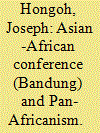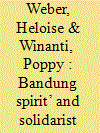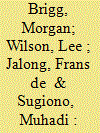|
|
|
Sort Order |
|
|
|
Items / Page
|
|
|
|
|
|
|
| Srl | Item |
| 1 |
ID:
145525


|
|
|
|
|
| Summary/Abstract |
The 1955 Asian-African Conference (Bandung) has been hailed as a turning point in the emergence of the Global South solidarity movement and a pivotal moment in southerners’ collective quest both to liberate themselves from colonialism and to reforge the international order on more inclusive and emancipatory foundations. In this article, the author demonstrates how, in Africa, these aspirations were undermined by nationalist ambitions that privileged self-contained sovereign statehood over potentially more progressive continental solidarity under the Pan-African spirit. The author does so by analysing how the absorption of the Bandung spirit within the Pan-African movement reinforced opportunities for the pursuit of national interests, the affirmation of colonial geographies and economies, and the intensification of forms of solidarities built on the imagined fruits of independence at the expense of a shared history of colonialism. For many African countries, the enduring lessons of the Bandung spirit reside in the challenges of resolving the tensions over the appropriate context for pursuing self-determination and transforming the international order. Thus, while the Bandung spirit delivered the means for newly independent states to engage in international politics through interstate solidarities, it also helped to accelerate the foreclosure of alternative possibilities for intervening in and reshaping the prevailing international order.
|
|
|
|
|
|
|
|
|
|
|
|
|
|
|
|
| 2 |
ID:
145526


|
|
|
|
|
| Summary/Abstract |
It must come as no surprise that traces of any continuing relevance of the ‘Bandung spirit’ are enthusiastically being sought in the wake of the sixtieth anniversary of the Asian-African Conference. It was the first high-profile formal conference of newly independent (or ‘about-to-be independent’) post-colonial states at a rather momentous historical conjuncture: the continuing struggles for decolonisation were pronounced in the context of the Cold War. The Final Communiqué of the Bandung conference strongly articulated a collective political project against colonialism and imperialism, and for self-determination and racial equality, while already laying the foundations for the idea of strategic non-alignment in the context of the Cold War. It is in this sense that the Bandung conference has come to be emblematic of an event that inaugurated a radically different international political landscape to the immediate post-1945 world order. In this article, the authors focus specifically on the development aspirations articulated at the Asian-African Conference in Bandung, which they argue are the site of struggles and contradictions. As the authors show, the ‘Bandung spirit’ underlined the political project of Third Worldism, as well as the call for a new international economic order in the 1970s. Yet, they also identify some constraints and contradictions that the ‘Bandung spirit’ had to navigate and the challenges it was up against. In the final part of the article, the authors briefly discuss the extent to which the ‘Bandung spirit’ continues to resonate in contemporary global politics of development.
|
|
|
|
|
|
|
|
|
|
|
|
|
|
|
|
| 3 |
ID:
145527


|
|
|
|
|
| Summary/Abstract |
Indonesia's normative leadership at the 1955 Asian-African Conference was grounded in anti-colonialism that became part of the ‘Bandung spirit’. However, the shape of Indonesia's recent leadership, following its remarkable democratisation, is harder to fathom. In response, this article suggests that Indonesia's regional and international engagements can be usefully understood through the lens of shifting domestic efforts to navigate unity with diversity, including as this is reflected in long-standing foreign policy commitments. Empirical reference points include the management of conflict in the Indonesian democratic transition, the place of civilian militias in Indonesian political life, and the Bali Democracy Forum. The case is made that Indonesia exhibits a remarkable embrace of diversity alongside substantial illiberality—a pattern that generates a flexible form of liberalism which presents difficulties, but also suggests particular opportunities for Indonesian leadership. Considering Indonesian navigation of unity with diversity enables a better understanding of the current and potential future shape of Indonesian leadership than analyses that rely on macro-level expectations of democratisation drawn from dominant liberal understandings of democracy and political order. This is in part because of the continuing salience of commitments to diversity, independence and cooperation that were articulated at Bandung in 1955.
|
|
|
|
|
|
|
|
|
|
|
|
|
|
|
|
|
|
|
|
|